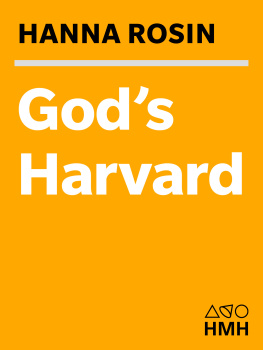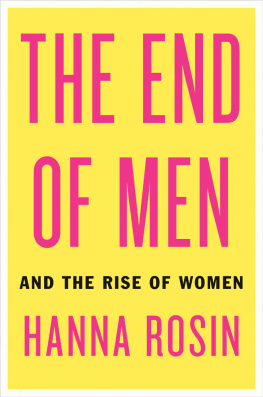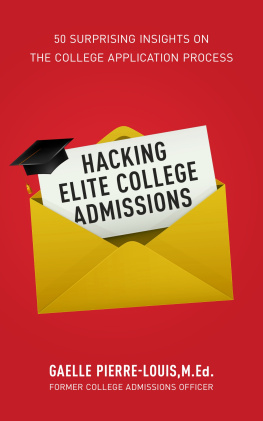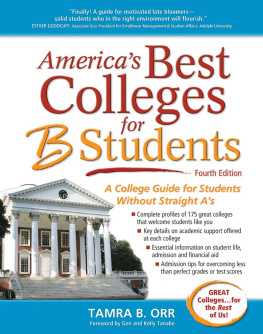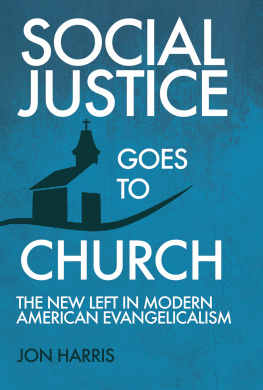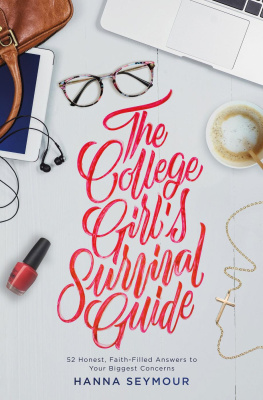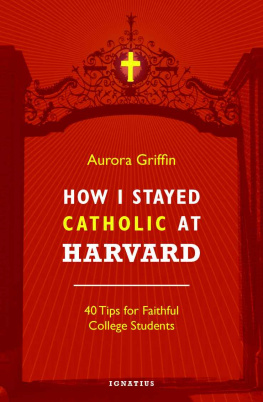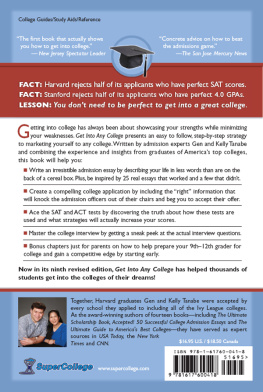Copyright 2007 by Hanna Rosin
All rights reserved. No part of this publication may be reproduced or transmitted in any form or by any means, electronic or mechanical, including photocopy, recording, or any information storage and retrieval system, without permission in writing from the publisher.
For information about permission to reproduce selections from this book, write to Permissions, Houghton Mifflin Harcourt Publishing Company, 215 Park Avenue South, New York, New York 10003.
www.hmhco.com
Grateful acknowledgment is made to the New Yorker, where portions of this book originated.
The Library of Congress has cataloged the print edition as follows:
Rosin, Hanna.
Gods Harvard: a Christian college on a mission to save America / Hanna Rosin.
p. cm.
1. Patrick Henry Community College. 2. College studentsReligious lifeVirginiaMartinsville. 3. College studentsVirginiaMartinsvilleConduct of life. 4. Christian educationVirginiaMartinsville. 5. Community collegesVirginiaMartinsville. I. Title.
LD6501.P39R67 2007
378.755'692dc22 2007015215
ISBN 978-0-15-101262-6
e ISBN 978-0-15-603536-1
v3.0515
To David,
my favorite and my best
Introduction
When I first began covering religion for the Washington Post, more than ten years ago, deflecting conversion attempts became a routine part of my work. Although they are unfailingly gracious, evangelicals are not so good at respecting professional boundaries. What did it matter that I was a reporter doing my job if I was headed for eternal damnation? To a population of domestic missionaries, I presented as a prime target: a friendly non-Christian who was deeply interested in learning more about their beliefs.
The first time someone tried to share the gospel with me, I naively explained that I was Jewish and born in Israel, thank you, thinking this would end the conversation. This was a big mistake. In certain parts of Christian America, admitting I was an Israeli-born Jew turned me into walking catnip. Because Gods own chosen people had so conspicuously rejected Jesus, winning one over was an irresistible challenge. And the Holy Land glamour of Israel only added to the allure. Preachers told me they loved me, half an hour after we met. Godly women asked if they could take home a piece of my clothing and pray over it. A pastors wife once confided to my husband, Youre so lucky. She looks so... Biblical. Once, at a Waffle House in Colorado with some associates of the influential Christian activist James Dobson, a woman in our company stared at me so hard it became uncomfortable for me to eat. Finally, I looked up at her. When I look at you, I see the blood of our Savior coursing through your veins, she said.
Thank you, I gulped. More maple syrup?
Explaining that my family had been Jewish for many generations and that, by converting, Id be breaking a deep, rich tradition only encouraged them to break out the big gun. Ive heard it so many times that I can recite it by heart. Matthew 10:36: For I have come to turn a man against his father, a daughter against her mother, a daughter-in-law against her mother-in-lawa mans enemies will be the members of his own household. Anyone who loves his father or mother more than me is not worthy of me. This didnt stick with me, either. Clearly they had not met my mother, or any Jewish mother for that matter. The Jews havent endured for nearly 4,000 years by giving their cubs up so easy.
Biblical verses, like turtlenecks, go in and out of style. During the nineties I heard Matthew 10:36 on nearly every reporting trip. This was a paradoxical decade for evangelicals. The Christian right had become a fixture in American politics and the nation was about to elect George W. Bush, the closest thing American evangelicals have had to a pope. At the same time the Christian home-school movement was boominga relic of the age of separatism and retreat. Evangelicals were poised to move from the fringe to the elite power circles of American society, but they just couldnt seem to make the jump. Unless they learned to polish their act and stop telling people to renounce their own mothers, they would never make it.
I first visited Patrick Henry College in September 1999, a year before the school opened its doors. The school, that afternoon, consisted of founder Michael Farris, a Christian home-schooling activist, manning an excavator on a construction site just off a Virginia highway exit. Farris was affable, his usual manner with reporters, as he laid out the plans for his revolution. The school would enlist the purest of born-again Christians in a war to transform America by training them to occupy the highest offices in the land. Year after year, it would churn out future congressmen, governors, and federal judges, until they finally had the majority. Few students will know more about the political ramifications of reinforcing homosexuality through special rights than ours, he told me. One day, he bragged, he would introduce the ultimate graduation-day speaker: President So and So, an alumnus of Patrick Henry.
It all sounded a little far-fetched. After all, he hadnt even laid the first brick.
Then Bush ran for president as a born-again former alcoholic, and won. Suddenly Farris seemed much less delusional. In the early winter of 2005 I visited again. The central building, Founders Hall, was now an impressive Federalist structure. Inside, the walls were covered with posters for an upcoming production of Oscar Wildes An Ideal Husband. A Whiffenpoofs-style singing group occupied the grand staircase. After talking to some kids having lunch, I concluded they were some of the most anal, competitive teenagers I had every come across. They input their daily schedules into Palm Pilots in fifteen-minute incrementsreadBible, do crunches, take shower, study for Latin quiz, write debate briefs. After Jesus Christ they bowed down to the 1600sthe handful of kids each year whod gotten perfect scores on the SAT. The atmosphere was much more Harvard than Bob Jones.
They resembled the overambitious junior executives who populate the Ivy League these daysonly without the political apathy. Hardly a dorm window, car bumper, bathroom mirror, or laptop went unsullied by some campaign sloganfor George Bush, John Thune, Bobby Jindal, or one of the many Christian conservatives who won during the 2004 campaign. Many students had taken a sanctioned two weeks off classes to volunteer for campaigns, and they were giddy with victory. One senior told me how shed sacrificed a couple of weekends helping out Bush adviser Karl Rove. One Saturday afternoon, he stopped by to give her a thank-you present. Good thing it was an ice-cream sandwich or I would have kept it forever!
You are the tip of the spear, Farris likes to tell his students at morning chapel, drawing on his limitless arsenal of military metaphors. Polls would place them among the 29 percent of Christian teens who attend church weekly, pray, read the Bible, and describe religion as extremely important in their lives. Sociologically speaking, they are a parents dream. They are less likely than most teenagers to cut classes, do drugs, have sex, get depressed, feel alone or misunderstood, talk back, or lie. Within the third of Americans who call themselves evangelical or born again they make up an elite corps, focused, disciplined, and not prone to distraction.
When they use the word Christian, they are speaking their own special language. To them, a Catholic or Mormon, with some exceptions, is not really a Christian. Someone who goes to church three times a year and sings hymns is not a Christian. Someone who goes to church every Sunday and calls themselves evangelical is not even necessarily a Christian. She thought I was nice and Jesus was a great guy and she went to church a lot, but she wasnt a
Next page
